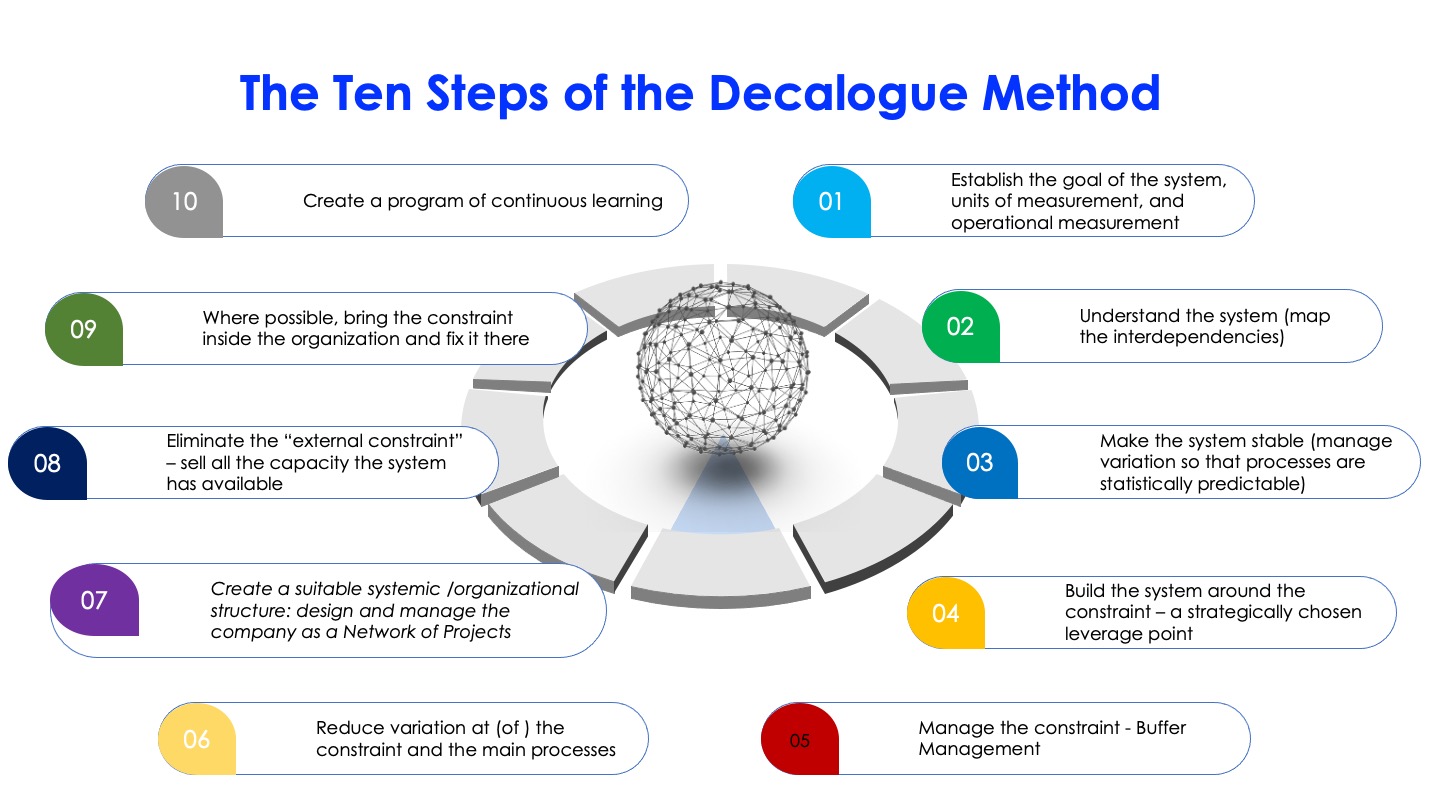
Today’s post ‘Our Reality is Systemic’ is by Dr. Domenico Lepore. It is an excerpt adapted from ‘Sechel: Logic, Language and Tools to Manage Any Organization as a Network‘ that is even more relevant today than when it was written during the global financial crisis.
Our reality is systemic. As communication becomes more instantaneous, we are increasingly aware that we are not separate from others the way we perceived ourselves to be in the past. Every one of us, at the level of individual, family, community, nation and beyond is interconnected; indeed, we are part of a network of interdependencies.
This is not simply a political and sociological stance. There is an underlying scientific basis for this shift in worldview away from a Newtonian, industrial age notion of the whole being made up of separate parts towards one of dynamic interconnection. We know from physics that living organisms can be viewed as systems, be they cells or solar systems, and as such they obey certain laws. We define a system as a network of interdependent processes that work together to achieve a goal. Such systems are made up of a web of interconnections. In other words, we are understanding more and more that our reality is systemic. For this reason, any attempt to govern countries or manage organizations that is not based on this awareness is doomed to create damage. The negative effects may not be immediate, but they will inevitably come.
What decision makers still fail to understand
If we have this knowledge, then why is it that decision makers fail to understand the long- term, systemic implications of their actions in virtually every sector of society? Why do we lack the basic intelligence needed to realize that every decision made for the advantage of a privileged minority and to the detriment of the majority will eventually lead to disaster? What is it that leads reasonably educated and, generally speaking, well-intentioned individuals to make one short-sighted, half-baked, non-systemic decision after another?
In November 2009 the US Department of Agriculture announced that in the previous year 49 million people in the USA had lacked consistent access to adequate food. In New York City, as of December 2009, there are 1.5 million people with no paid sick days and nearly 2 million who cannot read and write in English. Perhaps some business owners and city officials believe there is an advantage in keeping the population ignorant and unhealthy. What is more likely is that these people have a cognitive inability: they simply cannot draw basic cause-and-effect relationships between a sick person going to work in the morning and the spreading of illness (not to mention their inability to perform); between the growth of illiteracy and the drop in quality of necessary services to the community; between an increase in hunger and an increase in crime.
In the USA ordinary people borrowed over five years 1.4 trillion dollars that they could not repay and lost their homes; the “financial industry” developed 14 trillion dollars of various assets on the back of those loans and borrowed much more using these assets as collateral.
In 2009 the financial industry granted many tens of millions of bonuses to the ‘heroes’ that generate so much money in tax revenue to the government. The ‘only way out’ of the crisis seemed to be to rescue the banks. At the same time, a health bill to spend just under 1 trillion dollars over ten years raised concerns. The list of nonsense is endless.
Greed, lust for power, evil inclinations, cultural beliefs and historic circumstances are all part of human existence. However, the sheer and disconcerting inability displayed over the last forty years by the leaders of the western world, with few exceptions, to exert meaningful guidance, from world peace to the environment, from poverty and inequalities to the folly of modern finance, leads me to believe that the issue at stake is much deeper than a host of unguarded sentiments and unbridled instincts.
A unique moment in history
The recurrent inability of leaders to provide meaningful guidance has prompted me to write this book. I believe that, in spite of the disasters around us, we are experiencing a unique phase in our human history: we have the science, the knowledge and the tools to foster a more systemic use of the intellect to capitalize on our intuition, to develop thorough analyses, and to design and take correct actions for the common good.
We are talking about a more evolved form of human intelligence that allows intelligent, thoroughly thought-through decisions to be manifested through intelligent action. There is no precise term for this evolved intelligence in English, but it is perfectly described by the Hebrew word ‘sechel’. By integrating the scientific method with a more systemic use of the intellect we will achieve a greater level of sechel. In order to foster a more systemic intelligence, or sechel, we must increase the ability of our minds to connect three faculties of the intellect:
- intuition (the birth of an idea),
- understanding (development and analysis)
- knowledge (application/execution).
This sechel will enable a re-foundation of economics and management. My focus in this book is the systems-based management of industry. This is the area I have worked in for almost two decades. I believe that industry is where long-term, sustainable wealth for countries is created. Quite simply, no real economy can exist without a solid industrial infrastructure. The hope for the future of industry is Intelligent Management, and the purpose of our work is to provide the vision, the method and the know-how for achieving this obvious, but surprisingly rare, ability.
Systems-based management for a better future
We can define Intelligent Management as the cohesive integration of the scientific method with a more systemic use of the intellect. In the realm of management, by scientific method we mean the continuous improvement PDSA cycle (Plan Do Study Act) and its foundational element the Theory of Variation with its offspring Statistical Process Control (SPC). This is the bedrock of W. Edwards Deming’s Theory of Profound Knowledge. The discipline and precision of the scientific method prepares and habituates the mind to a systemic and constant effort towards continuous improvement. This mindset and cognitive ability can be reinforced and empowered through a formidable set of logical tools developed by the Israeli physicist Eliyahu Goldratt, who developed the Theory of Constraints. By integrating the scientific method with this systemic use of the intellect we will achieve a greater level of sechel, which is precisely what the world today needs so desperately.
For the last twenty years, in different capacities and in both Europe and North America, I have worked to enhance the business performances of a variety of organizations; industry primarily, but also government, healthcare and education. As a physicist turned ‘organizational scientist’, I have always acted by following a theory, i.e. a set of assumptions that I went on to validate or disprove. The main body of knowledge I was armed with was the Theory of Profound Knowledge set forth by Dr. W. Edwards Deming and the Theory of Constraints developed by Dr. Eliyahu Goldratt. From the mid-1990s with Oded Cohen I started to integrate these two management theories and this integration evolved into a coherent systems-based methodology that we called the Decalogue. We published our findings in 1999 in our book Deming and Goldratt: the Decalogue (North River Press).
Putting it all together: an algorithm for systemic management
From a philosophical as well as scientific viewpoint, the Decalogue attempts to shift management from the obsolete, Newtonian worldview in which the results of the whole organization equal the sum of its individual, separate and hierarchical parts, towards a systemic and interdependent network. The shift is achieved by combining the allegedly “reductionist” approach of the Theory of Constraints with a purely systemic view based on interdependencies and interactions. It does so in practical terms by:
- building interdependent processes managed through the control of variation
- subordinating these interdependencies to a strategically chosen element of the system called constraint
- designing the organization as a network of interdependent projects with a goal
Over the years, I had ample proof of the validity of Deming’s Theory of Profound Knowledge and Goldratt’s Theory of Constraints, and the results that were systematically achieved confirmed the solidity of the Decalogue. One of the cornerstones upon which both theories, and the Decalogue that brings them together, are founded is the desire and propensity that people have to learn. What I systematically ascertained is that this learning, almost invariably, does not translate into coherent applications. The “constraint” seems to be people’s ability to make good use of what has been learnt.
Naturally, I do not overlook the intrinsic difficulty of mastering the systems thinking required by the Decalogue; breaking free from the prison of analytical thinking that is taught in schools and universities is an enormous challenge. Moreover, business schools continue to churn out students that are taught that managing an organization passes through the individual management of its parts and, to add insult to injury, the prevailing measurement and accounting systems are based on local optima. I have plenty of experimental data (and emotional exit wounds) to prove that people are ill at ease when asked to change behaviours as a result of new learning. However, I am optimistic: sechel, the Hebrew word to describe the purely human ability to modify behaviours as a result of learning, is an ability we can systematically pursue and develop.
Going beyond our limits – it’s up to us
The ten steps presented in Deming and Goldratt: the Decalogue are the founding elements and the algorithm to sustain the transformational effort required to create and manage an enterprise as a system, as opposed to the hierarchical/functional model. Intelligent Management covers the global cognitive and philosophical landscape out of which the Decalogue emerges and exercises the three faculties of the intellect that have to be addressed: intuition, understanding and knowledge, i.e. sechel. Intelligent Management essentially ‘rethinks’ the main debaser of these three faculties in industry, i.e. the organizational design. Increased sechel and a suitable organizational design facilitate the adoption of the scientific method embodied in management by the Plan Do Study Act (PDSA) cycle and its underlying statistical content. Likewise, the adoption of the scientific method facilitates the creation of a suitable organizational design and an increased sechel: all three strands are interdependent and continuous, like the sides of a Mobius strip. This is Intelligent Management and the only limits to what it can achieve are the constraints we impose upon ourselves.
To find out more about ten guided steps to a systemic leap for your company, contact Angela Montgomery at intelligentmanagement@sechel.ws
SCHEDULE AN INTRODUCTORY CALL WITH US
Intelligent Management works with decision makers with the authority and responsibility to make meaningful change. We have helped dozens of organizations to adopt a systemic approach to manage complexity and radically improve performance and growth for 25 years through our Decalogue management methodology. The Network of Projects organization design we developed is supported by our Ess3ntial software for multi-project finite scheduling based on the Critical Chain algorithm.
See our latest books Moving the Chains: An Operational Solution for Embracing Complexity in the Digital Age by our Founder Dr. Domenico Lepore, The Human Constraint – a digital business novel that has sold in 43 countries so far by Dr. Angela Montgomery and ‘Quality, Involvement, Flow: The Systemic Organization’ from CRC Press, New York by Dr. Domenico Lepore, Dr. .Angela Montgomery and Dr. Giovanni Siepe.







Leave a Reply